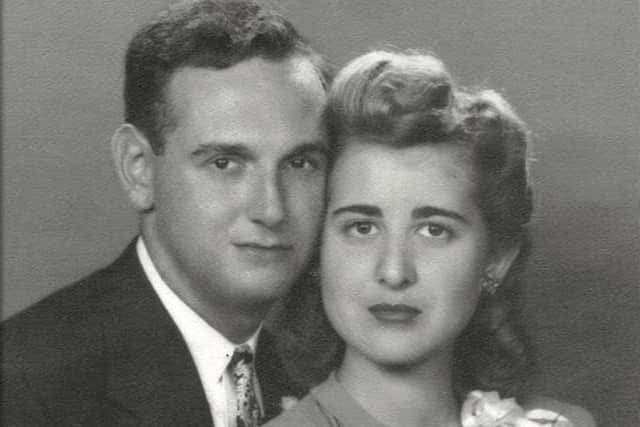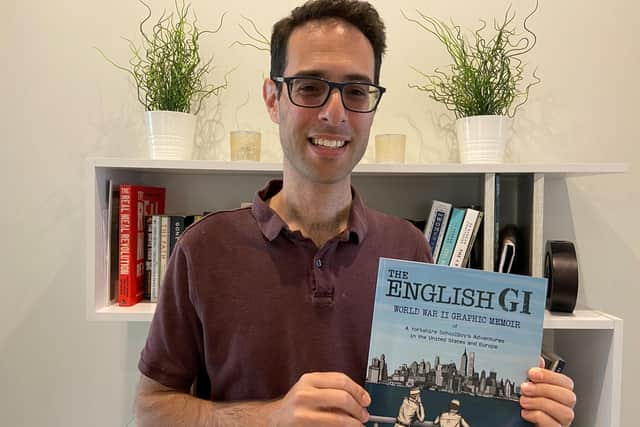The story of the Leeds schoolboy stranded in New York at start of Second World War who served with the US Army
Like many people of his generation who had experienced the trauma and atrocities of the Second World War, Bernard Sandler rarely spoke about it.
In an extraordinary set of circumstances as a Leeds schoolboy, he was left unable to return home from a trip across the Atlantic and ultimately went on to serve with the US Army.
Advertisement
Hide AdAdvertisement
Hide AdHe would have been the first to say how fortunate he was that he survived that time – and prospered back in his home country after the war had ended, his grandson Jonathan Sandler says.


But his experiences were rarely relayed to his family and friends, until the 50th anniversary of D-Day, when he wrote his memoirs and printed several copies for those closest to him.
Jonathan admits that his copy sat on a shelf for a good 20 years, but after a re-read of the tales during the pandemic, he has captured his grandfather’s experiences in a graphic novel.
“The book essentially describes his journey from being a young schoolboy all the way through to becoming a soldier and all the ups and downs of that story,” Jonathan says.
Advertisement
Hide AdAdvertisement
Hide Ad“He had quite a unique wartime experience, as a young Yorkshireman serving in the US Army due to some extraordinary circumstances.”


“We’re not quite clear how that came about,” Jonathan says, “but I think there was about 20 children who went on it from a number of different schools in northern England.”
His grandfather, studying at Leeds Grammar School, was waved off by his family from Liverpool docks as he embarked on the four-week trip.
When that came to an end, Bernard travelled to New York, where friends of his family were due to take him on a tour of the area.
They ended up hosting him for a number of years.
Advertisement
Hide AdAdvertisement
Hide Ad“He went to New York City on September 3, 1939,” Jonathan explains.
The date is significant; on that same day the then Prime Minister Neville Chamberlain announced that Britain was at war with Germany.
“My grandfather effectively became stranded in New York City,” Jonathan says.
He has worked closely with American illustrator Brian Bicknell to turn Bernard’s experience into a graphic novel, depicting his entire transatlantic experience.
Advertisement
Hide AdAdvertisement
Hide AdIt captures his time as a schoolboy unable to return home from the vast metropolis, to his discovery of the pleasures of jazz and Broadway theatre when he was student at New York University – where he met his future wife Taube Barash, a gifted art student, who encouraged his lifelong appreciation of modern art – all the way to him being called up into the US Army.
He was ultimately sent back to Europe, serving in the brutal Lorraine Campaign, in France, in late 1944 under General Patton’s Third Army.
“In August 1944, he was part of something called the 26th division of the US Army and they sailed from New York to France,” Jonathan says.
“At that stage the Normandy invasion had happened and the Germans were on the retreat.
Advertisement
Hide AdAdvertisement
Hide Ad“My grandfather was involved in some very serious fighting in November of 1944 and was injured.
“He was then flown over to Dorset to an American army hospital and his parents managed to locate him.
“They had a wonderful reunion in Dorset after five and a half years.
“Then he went back to the United States in March of 1945 and he then convalesced and saw out the rest of the war in the US before he was discharged.”
Advertisement
Hide AdAdvertisement
Hide AdIt was Jonathan’s children taking an interest in the war and how it affected their family that prompted him to read his grandfather’s memoirs again in 2020.
A fan of graphic novels, the idea for The English GI: World War II Graphic Memoir of a Yorkshire Schoolboy’s Adventures in the United States and Europe was born.
While Jonathan remained faithful to his grandfather’s original wording, he enriched the content with details that he learned from comrades Bernard had served with.
Jonathan also discovered an online archive of a sketchbook belonging to another soldier, Victor Lundy, who gave Jonathan and the illustrator added insight, particularly into the voyage from New York to France.
Advertisement
Hide AdAdvertisement
Hide AdThe book also allowed Jonathan to explore and understand the various branches of his family’s Jewish heritage, including the story of Bernard’s family in Leeds and the fate of his wider family in Latvia, whom Bernard had visited with his father in 1937 and who experienced hardship and tragedy in the Second World War.
After the conflict, Bernard and Taube married in New York before moving to Leeds, where Bernard helped to build up the Hurst and Sandler family business, which included a large clothing factory and department stores across Yorkshire.
“His wartime experiences helped open his eyes to the wider world he was living in, and were important in forming his liberal, often quite radical political outlook,” Jonathan says.
“Inspired by his time in New York in the 1940s, and his introduction to the arts there, he went on to lead a full and creative life in the UK.
“New York in the 1940s was the place to be,” Jonathan adds.
Advertisement
Hide AdAdvertisement
Hide Ad“One of his legacies is that he was one of the founders of Leeds Playhouse in 1970.
“After that, when he retired from is family business, he became an independent theatre producer.
“Successful plays he produced included Steaming, Pack of Lies and The Secret Diary of Adrian Mole Aged 13¾.
“From the mid-70s he devoted much of his time to promoting excellent fringe theatre, and became Chair of the Theatre Royal Stratford East, and of the Tricycle Theatre in Kilburn, North West London...He died in London in 1998.”
Advertisement
Hide AdAdvertisement
Hide AdAs for the book, Jonathan hopes it leads people who haven’t read a graphic novel before to experience the medium.
“One of the reasons I decided to go down this route is because it’s quite accessible, it’s quite easy to read,” he says.
“If I’d written a 200-page novel, the reality is people would maybe buy it, close family and friends, but would never read it.
“I felt like this was a much easier format, in a competitive landscape for books.
Advertisement
Hide AdAdvertisement
Hide Ad“I also wanted to inspire people to do more research about their own families and I think already people are doing that.
“Everybody’s Second World War story is special and interesting.”
The English GI is out now and is available to purchase through Amazon.
